Phil Collins
Christine Grail
When did Phil Collins stop smiling? A quick web-image search suggests he hasn't smiled in a decade. He often smirks or half-smiles, but an honest, deep, from the soul smile is rare for Collins.
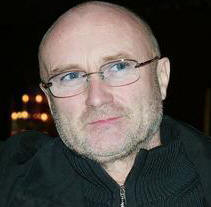
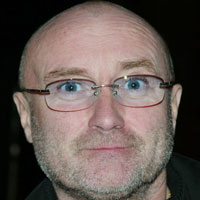
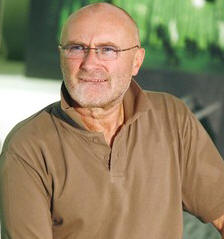
Collins is among the most talented and successful pop musicians. As love and marriage, talent and success seldom go together in pop music. Most often, success, that is, marketability, defines talent: if a band attracts an audience, whatever it does is talent.
This isn't the case for Collins. His talent came before his marketability or, at worst, about the same time. "Against All Odds" is a work of talent, which found success. Collins has much reason to smile, with glee.
Collins has eight number one singles, in the USA. His solo career sales top 175 million units, worldwide. "Genesis" sold 100 million units, on his watch. This isn't a minor success or luck, rather marketable talent. Collins should smile, widely, all the time.
If health, wealth and fame are not enough to make Collins smile: what gives. Most anyone would be giddy, with joy. A brief review of the Collins career may provide a hint or not.
Collins laid the soundtrack for many lives. Women and men grew up and grow old to his rhythms. Each of us can hum along, off-key, to one or more of his songs. In the shower, everyone tries to sing "Into the Air, Tonight," "Easy Lover" or it, "Sussudio." Yet, the pleasure, of the Rock or Pop Star label, eludes Collins; so, too, his full celebrity. Else, surely he'd smile.
Born Philip Charles David Collins on Tuesday, 30 January 1951, he grew up in Chiswick, a suburb of London, England. His father, Greville, sold insurance. His mother, June, was a talent agent. She worked for the Barbara Speake Stage Agency. The Agency still represents Collins.
The best nurturing for natural talent is when mum's a talent agent and dad has a reliable job. Older brother, Clive, is a renowned cartoonist. Sister Carole was a champion figure skater.
As a child, Collins was an actor and model. "He mostly auditioned," says a wag who knows Collins. At age 13, he portrayed "The Artful Dodger," in a West End production, of "Oliver." He also had a fleeting close-up, as a member of a screaming concert audience, in "A Hard Day's Night."
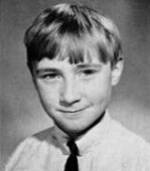
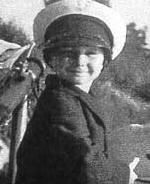
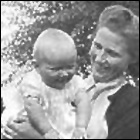
A toy drum kit, a gift for his fifth birthday, aroused an interest in music. At age 12, Collins bought his first full drum kit. Household tables, chairs and various relatives surely took a heck of a rhythmic beating all those seven years.
If you believe his parents, Phil was an exceptional child, but gratingly so. Compulsive seems more the term. This is a common feature of brilliant, lasting talent, no matter the line of work or gender.
Collins claims a deep passion for music, but maybe far less for performing. His music carries much passion, atypical for pop or rock. His lyrics are often subtle, deep and pithy, but passionately idiosyncratic. During live shows, on his own or with "Genesis," he seems far away.
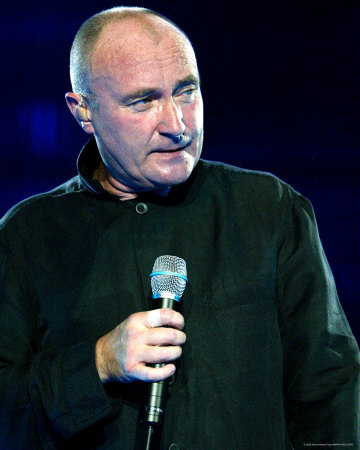
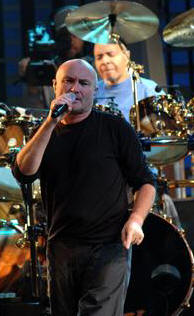
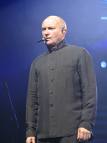
Collins, live, often brings to mind the teacher crossing the MIT campus, at dusk, on a Saturday evening. "There goes the absent-minded professor," joked a student. The eminent teacher stopped and turned to the students. He said, "Do you mean my mind is present elsewhere?" Collins, live, fits the role of absent-minded professor.
Collins claims he escaped the conceit and mind-set commonly linked to fame. He disdains the label, Superstar. He prefers how "USA Today" described him: an everyday friend. Fame muddies the view. It's not good to believe your own press.
Off-stage, Collins is solo and has few friends, report several sources, His children say, publicly, they don't know the man they call "Dad," He agrees.
Maybe Collins is an eremite. He seems a reclusive, of sorts, under a creative, not religious, vow. Music is his heaven, to paraphrase the poet, John Keats, and Collins its eremite.
Eremites surely smile, as they ponder the saints or gawd. Does Collins furtively smile, as he ponders his music? Is he a closest smiler? Maybe, but a sample is nowhere found.
Phil Collins seems an alternative spelling for success. As a child, mother June arranged for him to audition for commercials, films and modelling. What great experience. In 1964, he portrayed the "Artful Dodger," in "Oliver." Collins says the "Artful Dodger" was "his most enjoyable acting experience." The same year, he joined the audience, for a performance, by the "Beatles," in the movie, "A Hard Day's Night."
At 18-years-old, Collins played on the George Harrison hit, "The Art of Dying." A few years later, he led a renewal of "Genesis," a mediocre pop act. His solo career began, at age thirty, with the single, "In the Air Tonight" Three years later, an album, "No Jacket Required," was the apogee, of his solo recording career.
Collins has no formal music training. He began playing drums, at age five. Much to the distress, of his parents, he constantly practiced drumming, on any flat surface and to any rhythm, he heard. His uncle cobbled drum kits, for Collins. At age twelve, he got his first proper kit.
Success may be chaotic, but seldom so unbearable to deny a smile or ten. A fleeting role, in a movie, by the "Beatles," would make any of us giddy and gleeful, smiling our way through a life. Collins smirks, at best.
Acting takes second place to music, for Collins. In 1968, Franco Zeffirelli declined to cast him, in a new version, of "Romeo and Juliet." Collins decided it was time to focus, full-time, on music. The Zeffirelli audition was one too many. Collins formed his first band, "The Real Thing."
Collins believed, firmly, he'd be a music star. Nothing would stop him. He'd be a pop or rock star, against all odds. A determination to succeed overtook him.
The obsessive child became a driven adolescent. "The Real Thing" rehearsed all the time, after-school, on weekends and during lunch. Band members recognized his talent, but Collins drove himself, and them, too hard. (Below, cast, of "Oliver," about 1964, Collins in hat; Collins, at play, about 1965; and about 1966.)
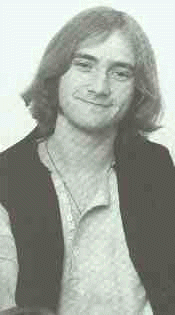
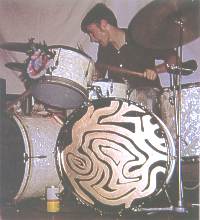
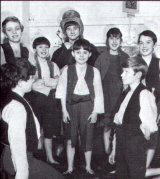
After committing to music, Collins began to hang out at the "Marquee Club," in London. For four decades, the Marquee booked top UK talent. It was an important meeting place, for musicians, as CBGB, in New York City.
The Marquee Club opened on Saturday, 19 April 1958. Its original location was 165 Oxford Street, London. Club founder, Cyril Davies, passed away on 7 January 1964. New owner, Harold Pendleton, moved the Marquee to 90 Wardour Street, in the Soho District, of London. The relocated club opened on Friday 13 March 1964.
The club moved several times, again. To Charing Cross, in 1988. To Islington Academy, in 1995. To Leicester Square, for a year, in 2004. Today, the Marquee Club is at 14 Upper St. Martin's Lane.
At the Marquee, on Wardour Street, Collins traded menial tasks, such as setting up chairs, for a free admission to the shows. Collins met Eric Clapton, Jimmy Page and Steve Winwood, at the Marquee. These contacts and the experience fuelled his drive.
Collins wasn't a passive listener, at the Marquee. He was always front and centre, watching the best rock musicians, of the day, and learning. As a sponge, Collins absorbed the work, of Keith Moon and Mick Fleetwood; Bill Bruford, of "Yes," was his favourite.
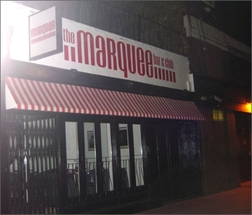
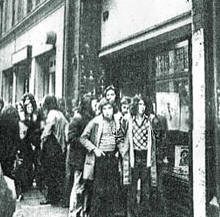
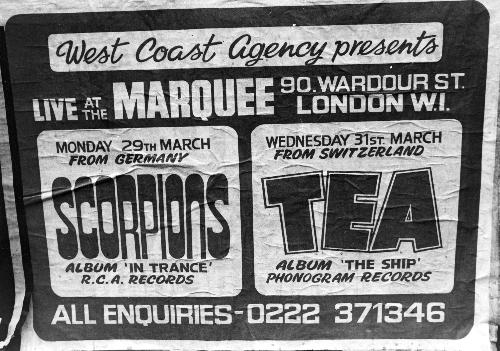
Nights at the Marquee Club surely produced many grins, if not smiles. It's interesting that drummers are usually laughing and smiling, whereas guitar players are often more sullen. Collins seemingly took cues from the wrong band members.
The next step, for Collins, was "Freehold." This was a local, Chiswick band. During his months, with "Freehold," Collins wrote his first song, "Lying, Crying, Dying." (Below, about 1968, "Freehold;" Collins is left in both photographs.)
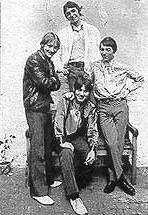
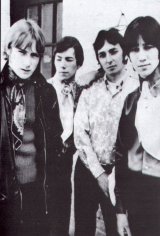
Collins spent a few months as drummer for "Hickory," before joining "Flaming Youth." He met Ronnie Caryl, bass player, of "Flaming Youth," at the Marquee Club. Caryl had seen "The Real Thing" perform. Collins impressed Caryl, who made it possible for him to join "Flaming Youth." (Below, Collins and Caryl, about 1969.)
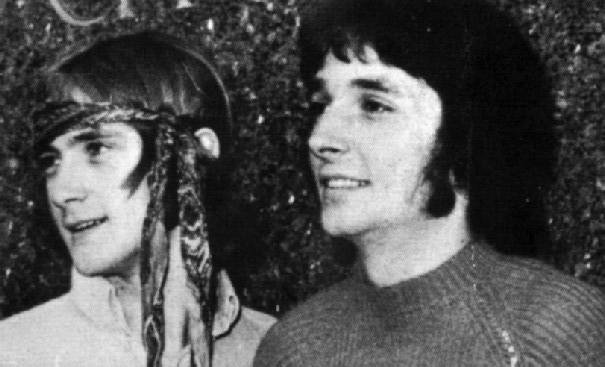
Caryl and Collins became great friends. When the Caryl family moved to Germany, Ronnie moved in with the Collins family. Collins and Caryl joined "Flaming Youth," in 1969. (Below, 1969, "Flaming Youth." Collins is second and third from left.)
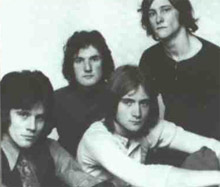
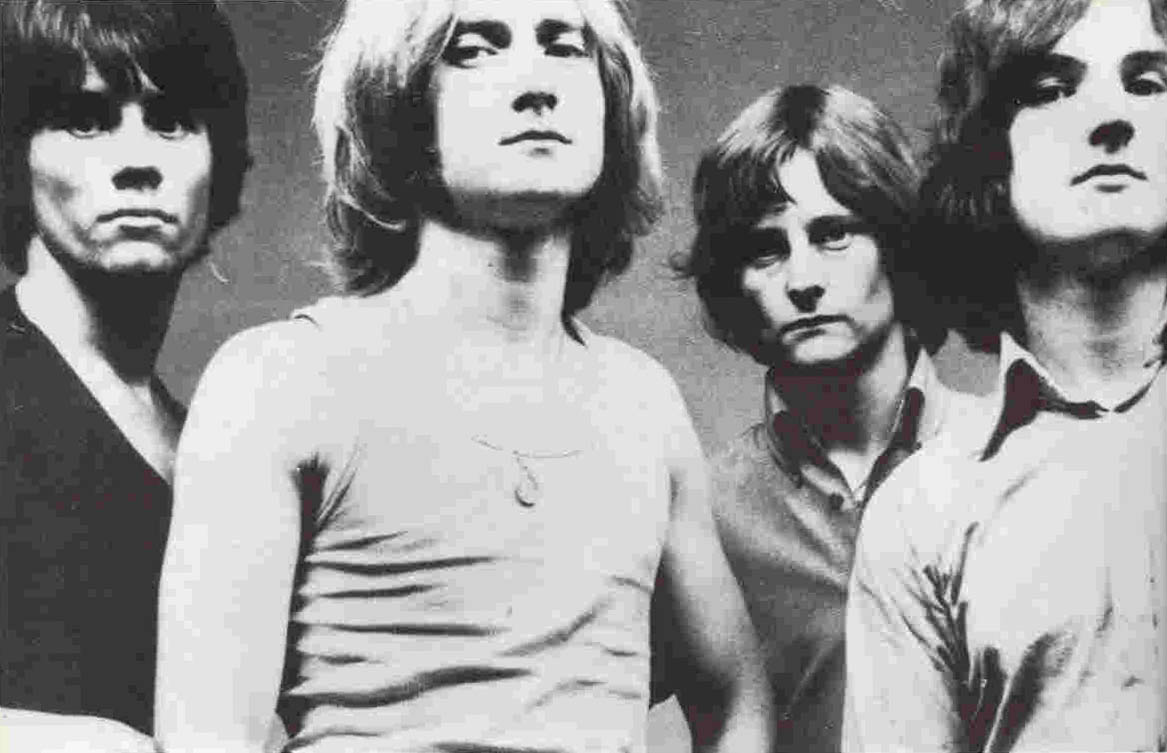
Musically, "Flaming Youth" had much potential. Managers Ken Howard and Alan Blaikley easily worked a deal, with Fontana Records. The result was "Ark 2," a "concept" album
Apollo 11 landed on the moon, on 20 July 1969. "Ark 2" focused the event. "Melody Maker" named "Ark 2" Pop Album of the Month. Despite much critical acclaim, "Ark 2" didn't sell. (Below, cover of "Ark 2" album.)
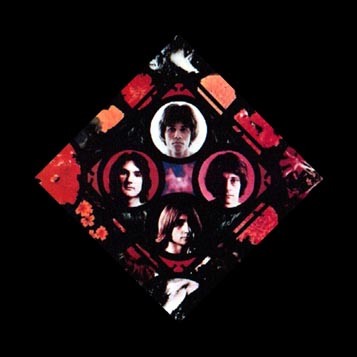


A follow-up single, "Man, Woman and Child," failed to catch on. Rod Mayall, an organist, joined "Flaming Youth" and its style grew more free-form. After touring and disagreeing about everything, "Flaming Youth" broke up.
A few weeks later, Collins and Caryl answered an advertisement, in "Melody Maker." A moderately successful band needed a drummer and bass player. The drummer must be sensitive to acoustic music.
Wisely, Collins and Caryl arrived early. They listened to other auditions. When his turn came, Collins knew the arrangements "Genesis" was auditioning. He got the job, but Caryl didn't make the cut. Knowing how to audition paid off, for Collins.
Collins impressed Peter Gabriel, singer for "Genesis." "I [noticed] as he sat down, on the [drum kit] stool," says Gabriel. "It was like watching a jockey get into the saddle, and instinctively knowing, from [how he moved], that here is someone who knows what he's doing [as a drummer]."
Before Collins, "Genesis" had had many false starts. The band had gone through three drummers, two in twelve months. Collins and new guitar player, Steve Hackett, helped "Genesis" click.
"Genesis" found a niche. Perfectionist Collins offered debriefings after concerts. He devised lists, of what and who went right or wrong. Though not the official leader, of "Genesis," Collins became the technical driving force, the "coach" of the band. (Below, promotion photograph for 1972 tour; Collins is second from left.)
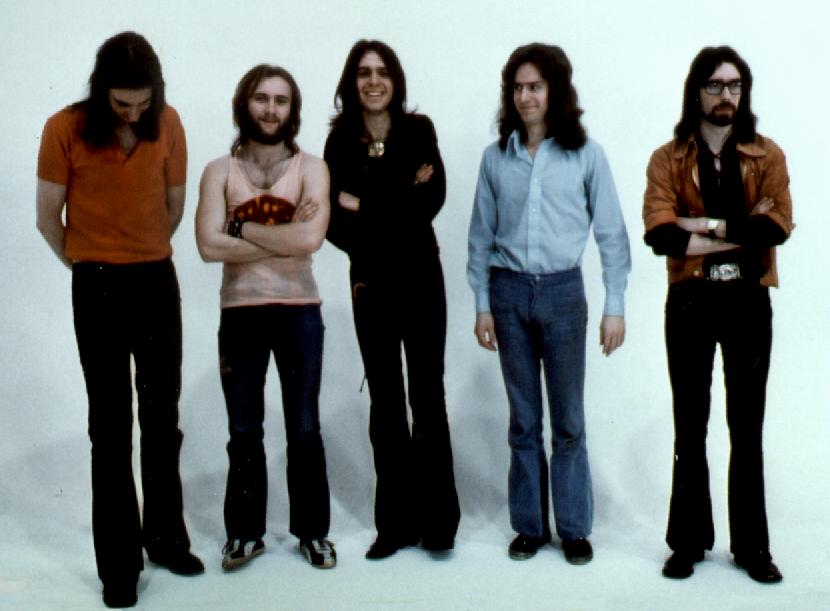
They were lucky he didn't make them practice during lunch, as he had, with "The Real Thing." No one can argue his contributions weren't valuable. He was a huge part of making "Genesis" a success.
Gabriel began making creative leaps. The stage show became performance art, in a sense. "Genesis" began using elaborate costumes, theatrics and special effects.
Audiences enjoyed Gabriel. Concert attendance grew and became more predictable. The other members, of "Genesis," weren't so sure about Gabriel, but didn't mess with success.
Collins thought music was taking second place to performance. Audiences watch "Genesis," he said, they don't listen. The band continued to gain popularity, with hit albums and sold out tours, but concerns stewed below the surface. (Below, promotional photograph, about 1974; Collins, second from left, above Gabriel.)
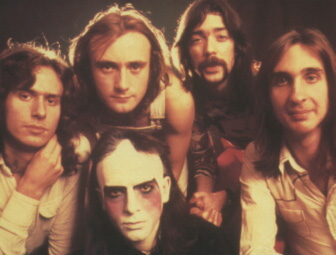
Collins spent the time between "Genesis" recording sessions and tours, with another group, "Brand X." This was a jazz fusion band. He also worked as a studio musician and did some producing.
In 1973, "Genesis" changed managers. Tony Smith, the new manager, arranged "The Lamb Lies Down on Broadway" tour, for 1975. During this momentous tour, creative differences flared.
Peter Gabriel left "Genesis," at the end of "The Lambs ..." tour. After much discussion, Collins took lead vocals. It was the best move "Genesis" would make, in its long history. His unique style, fresh sound and boundless energy rejuvenated a band, quickly approaching its stale date.
Of the move, Collins said, "I'm not a singer who plays a bit of drums. I'm a drummer that sings a bit." Bill Buford, a hero of the young Collins, joined "Genesis," to backfill the drumming. Chester Thompson replaced Buford, in 1977.
In 1977, Steve Hackett also left "Genesis." In two years, the band went from quintet to trio. Collins was now in full charge.
The album, "... and Then There Were Three" was an unsubtle reference to how "Genesis" shrunk. This album grabbed the attention of radio, like no other "Genesis" record. The band had its biggest hit records, "Follow Me, Follow You" and "Land of Confusion," off this album.
Collins had the star status he wanted so much. He wasn't a typical celebrity, someone known only for his or her well-knownness. Collins earned the status, through a mix of hard work, raw talent and solid judgment. There was much to smile about, you'd think.
Collins wasn't all work. A hit among young women, his striking blue eyes and blond hair, not to mention success, made him stand out. Collins openly dated several young women, at the same time.
His adult approach to romance is a stark contrast to his adolescent view. Collins became a one-woman man. In 1975, he married Andrea Bertorelli, a Canadian studying drama, in London. (Below, photographs from the Collins and Bertorelli wedding, 27 September 1975.)
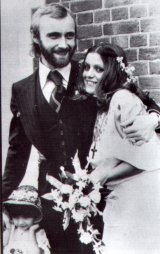
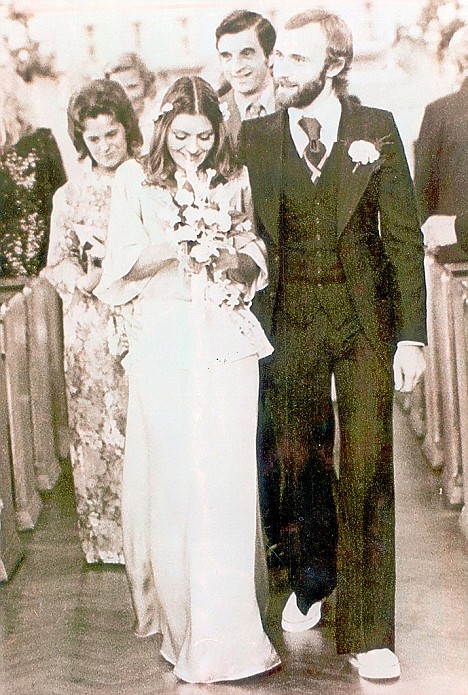
Bertorelli had a three-year-old daughter, Joely, whom Collins adopted. Collins and Bertorelli had a son, Simon, in 1976. Joely is a prominent Canadian actor. Simon is a prominent Canadian musician, working out of Germany.
Bertorelli and Collins married between "Genesis" tours; he took over lead vocals about the same time. She lived in Vancouver, BC, with the children. He worked, endlessly. When home, work came first.
The marriage cracked, soon, doomed as it began. Bertorelli and Collins divorced, in 1980. She ostensibly had an affair, with their painter and decorator. In a 1981 performance, on the BBC show, "Top of the Pops," Collins sang, "In the Air Tonight," a paint pot and brush, atop his piano.
Collins didn't recognize his part in the break up. He took the divorce hard. The angst and pain, he felt, drove his creativity and inspired his first solo album, "Face Value."
His biting lyrics, for "In the Air Tonight," "If Leaving Me is Easy" and "I Missed, Again," reflected the lives of pop radio listeners. Early middle-aged "Baby Boomers" knew well of what Collins wrote. "Face Value" confirmed Collins as a pop star and, now, a songwriter.
"Hello, I Must Be Going," the second solo album for Collins, also stressed betrayal, bitterness and hurt. This time, his themes got a luck-warm reception. Most critics didn't care for "Hello ..." It didn't sell as expected.
In December1982, Collins began his first solo tour. The unlikely tour title was "Phil Collins in Concert with the Fabulous Jacuzzis and the One Neat Guy." The "Neat Guy" was likely American guitar player, Daryl Stuermer, who's constantly with Collins. Exhausting and long, the solo tour separated Collins from "Genesis," confirming his success as a solo act.
According to the media, Collins was warm and enthusiastic, well received by audiences at his solo shows. Some media writers caught a good show. Others wrote rumours.
In 1980, after a "Genesis" show, in Los Angeles, Collins met Jill Tavelman. She was young, childless and free to follow him, on tour. "They got along so well," said a friend. "We thought they were joined at the hip." (Below, wedding photograph, of Collins and Jill Tavelman, on 4 August 1984; left, Collins, daughter, Lily, and Tavelman, about 1989.)
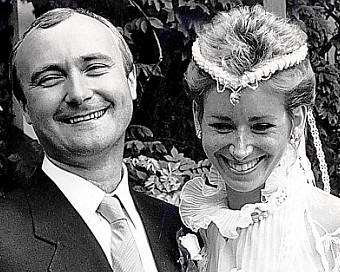
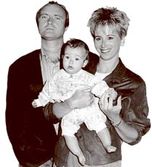
Tavelman and Collins married in 1984. A daughter, Lily, born in 1989, is now an actor and a cast member of "90210." In 1994, Collins advised Tavelman, by fax, that he wanted a divorce.
The fax leaked to the press. The uproar was predictable. Their divorce settled in 1996. Tabloids reported Collins paid Tavelman 17 million pounds, to end the marriage.
Though work-alcoholic Collins drifted from Tavelman, over the 12-year marriage, there seems a woman to blame for the divorce. In 1994, Collins met Orianne Cevey, a 22-year-old. The Swiss-born Cevey worked as a translator, on his 1994 European tour.
Cevey and Collins married, in Switzerland, in 1999. The ceremony reputedly cost three hundred thousand pounds. They had two sons, Nicholas and Matthew.
Collins and Cevey separated in January 2006. The "Daily Mail," a British newspaper, reported grand mum, June Collins, said Cevey had a severe bout of the baby blues, after the birth of Matthew. This was the cause of separation (22 August 2008). Grand mum Cevey agreed, saying, "We don't think Orianne even knew she was suffering from it." (Below, miscellaneous photographs of Collins and Cevey.)
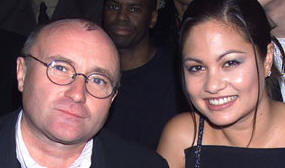
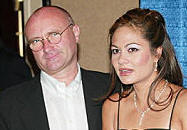
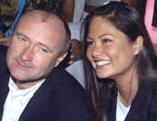
The divorce settled in 2008, costing Collins about 25 million pounds. The settlement is the largest paid by any British show business personality. Three marriages cost Collins about 41 million pounds, as Bertorelli reputedly received about 5 million pounds, over the years.
Asked about his lack of marital success, Collins said, "Marriage is a difficult proposition. I haven't given up on it, either." Reasonable guesses put his net worth at 140 million pounds. Yes, Philip, you can afford another marriage.
Collins admits he's not much a father. "My children," he says, "see me as a relative failure ... in terms of being there for them. I tried my best over the years to be there, but I could have done more. I should have done more."
Paul Scott, of the "Daily Mail," notes, "Collins has hardly used his recently acquired single status as an excuse to paint the town red. ... free from the constraints of marriage, he has been indulging himself in some substantially more sedate bachelorly pursuits ... [such as] working on his model trains."
In May 2006, Collins met his current romantic interest, Dana Tyler, of CBS News. She's 47, divorced and independent. Collins recently bought an apartment in New York City, where Tyler works.
In the past, work got Collins through his travails. According to Scott, "work has lost its appeal, over last few years, for Collins." Model trains are now his consuming passion.
As his solo career developed, Collins continued working on other projects. He collaborated-with or produced Eric Clapton, Pete Townsend and Adam Ant - can you believe it. He also had time for a "Genesis" tour or three.
During the 1983 "Genesis" tour, Collins composed the theme song for "Against All Odds." The movie, directed by Taylor Hackford, is a meat and potatoes tale of love, possession and exploitation. The theme song, a 1984 hit single, is epoxy that holds the wobbly story together and sells the movie.
The lyric, for "Against All Odds," grieves for a second chance. The music evokes images, of Charlie Parker dry-nursing his "6M Lady Face," E-flat Alto sax. The Oscar nomination is trivial.
Relative obscurity, in the USA, kept Collins from performing, at the Oscars, or winning. No matter how hard one works, into every career or life, falls a defining moment. For Collins, "Against All Odds" is his defining moment.
Next, Collins wrote the theme song, "Separate Lives." It was the love theme, for the movie," White Nights," also directed by Taylor Hackford. Collins and Marilyn Martin performed "Separate Lives," on the soundtrack. It, too, was a hit.
"No Jacket Required," released in March 1985, is the most successful album for Collins. "No Jacket ..." gave up four hit singles, including "One More Night", "Sussudio," "Don't Lose My Number" and "Take Me Home." "Sussudio," a nonsense song, based a simple rhythm, was his first venture into the Dance Music vein and the biggest hit from this album.
In 1988, Collins had the lead role, in "Buster," a movie about one of the Great Train Robbers, Ronald "Buster" Edwards. This brief reversion to acting flopped. Still, Collins got two hit records, "A Groovy Kind of Love" and "Two Hearts," out of it.
Charities are important to Collins. In 1976, HRH, the Prince of Wales, created the "Prince's Trust," to help children, worldwide; Collins was a founding member. The Trust produces an annual pop and rock concert, featuring stars from the UK. Collins also routinely gives items, for fund-raising, to many charities, including People for the Ethical Treatment of Animals (PETA).
His first charity performance was "The Secret Policeman's Other Ball," in 1981. This was the fourth and best "Ball," in a series of annual shows, hosted by John Cleese. The charity was Amnesty International. The 1981 show continues to run, late-night, on television stations around the world.
In 1984, Collins performed, on the charity single, "Do They Know It's Christmas," for Bob Geldof. Collins opened the 1985 "Live Aid" show, at Wembley Stadium, in London. He also closed it, the same day, at JFK Stadium, in Philadelphia, courtesy of the Concorde. About 400 million people, in 60 countries, watched "Live Aid."
His lyric for "Another Day in Paradise" raised awareness about poverty and homelessness. Stadium and arenas, on the tour for this album, "But Seriously," collected food donations from attendees. His next album, "Both Sides," dealt with the problems related to prejudice and stereotypes.
After leaving "Genesis," in 1996, only to return for a tour, in 2007, Collins found a new avenue for creativity, that is, films. He wrote and recorded, "You'll be in My Heart," for the animated Disney film "Tarzan." The song won an Oscar, a Grammy and a Golden Globe.
He followed "Tarzan," by collaborating, with Tina Turner, on the soundtrack of another animation, "Brother Bear." Collins lent his voice to two characters, in an earlier animated film, "Balto." In 2003, he voiced characters for "Jungle Book 2."
Collins also tapped into the video game market. He portrays himself in the popular "Grand Theft Auto: Vice City." In the game, players must rescue him from a gang, which is trying to kill him during a concert. If the rescue is successful, the players get to watch a performance, "In the Air Tonight."
In 2004, Collins said he'd tour no more. A viral infection left a severe buzzing in one ear, which made live shows and travelling difficult. His 2002 solo album, "Testify," also flopped. Perhaps the time was right to return to model trains.
A farewell tour, Collins thought, was a good way to end this phase of his life. The "First Final Farewell Tour" ran for almost two years. A DVD, of the tour, "The Long Goodnight: a film about Phil Collins," is available. His shows in France are especially good.
His touring days over, Collins joined the "house band" for the Golden Jubilee celebrations of Queen Elizabeth II. He returned to "Genesis," for its "Turn It on Again" tour, during 2007 and 2008. On the side, during the "Genesis" tour, he performed with Ozzy Osborne, Paul McCartney, Eric Clapton, "Led Zeppelin" and Cliff Richard, among others.
Collins now works on his model trains, in his Swiss hermitage. His sons, Matthew and Nicholas live, with their mother, nearby. Collins splits his time between Geneva and a home in New York, where Dana Tyler works.
In June 2009, music industry buzz had Live Nation and AEG madly negotiating for rights to the "Second Final Farewell Tour," of Phil Collins, but apparently not so. On 19 October 2009, Collins told the Hamburg "Abendblatt" that after surgery, in April, to repair a dislocated neck vertebra, he lost feeling in his fingers and can't hold drum sticks. Such injuries take up to a year to repair, if at all.
Collins still promises a 30-song album covering Motown hits for 2010. "I want the songs to sound exactly like the originals," he says. Will three albums of standards follow? Does Collins now think he's Rod Stewart?
Why does Collins not smile? Astounding success, fame and family life, if imperfect, are his, earned and true. Few can claim as much. Holy karumba, what does it take?
His sense of public responsibility, evinced by charity work, is strong. Has anyone told Collins that smiling saves energy? A smile flexes about 12 muscles. His almost permanent grimace uses more than 60 muscles. He can save the planet, smiling, and Al Gore will embrace him.
Maybe Collins wants a peerage. Sir Philip of Chiswick has a ring to it. Saying the word, Chiswick, aloud, puts a smile on your lips. What happened to Collins?
A few years ago, Collins appeared on "The Kumars at No. 42," an insanely funny UK comedy. "The Kumars ...," centres on Sanjeev, the 30-something son, of a family, of Indian descent. Inept, socially, Sanjeev has many delusions.
Mostly, Sanjeev thinks himself a talk show host. The back garden, of the family home, number forty-two, in Wembley, contains a talk show stage. His parents and grandmother form a panel that helps question guests.
The show cleverly uses stereotypes, more from the British working-class than from India. Still, a running joke is each guest receive chutneys, spicy Indian seasonings, as payment for helping the family sate Sanjeev. The idea, for "The Kumars ...," is enough to make one giddy.
Fortyish Meera Syal portrays the grandmother, Sushil "Ummi" Kumar. She gets the funniest lines. To actor, Helena Bonham-Carter, Ummi says, "In [the UK] you're seen as the epitome of elegance and good manners. I personally was very, very happy to see you in 'Fight Club,' playing a right old slut. Did you enjoy it?"
For reasons to bewilder the subtlest minds, Collins appeared on "The Kumars ...." He grimaced and facially moaned for 17 minutes. "The Kumars ..." is a roast, almost in the tradition of the Friars Club, but Collins is not open to roasting. His time, on set, was a painful sight and he hastily left without his chutney.
The one moment, of seeming comfort and lucidity, for Collins, was when Sanjeev asked about his brother, Clive, the world-renowned cartoonist. Talking about Clive and his success, Phil almost relaxed. Even Sanjeev noticed the change and knew he was on to something, but Clive came up at the end of the show.
Aha, the game may be afoot. Collins seemingly takes pride in his siblings, but not himself. This is a trait often obvious among remarkably successful men, but not equally successful women.
All available photographs of Collins are public. In public, he's reluctant about his successes. Maybe the photographs reflect this reluctance to smile, as he relates it to his success, but not a refusal.
Collins has reasons to smile, publicly. He has difficulty accepting those reasons. For Collins, his hard work doesn't jive, with moronic paparazzi demands.
There's no Freudian or Jungian subtly here. For Peter Gabriel, all those years ago, performance held the meaning and he left "Genesis" to the drill sergeant. For Collins, the never-ending hard work, the drudgery, of creativity and expressing creativity holds the meaning.
Hard work is the goal, for Collins and his siblings, Clive the cartoonist and Carole the figure skater. If the end, a great song, for example, doesn't lead to further creative expression through hard work, there's little, if any, meaning. This is no sin, of course, and only commendable, but most of us enjoy some non-work pleasure, leisure, from the fruit of our hard-work.
Fame and, perhaps, fortune are corollaries of a heavy-duty work ethic. For Collins, fans pay to hear the music, the product of hard work, and his distance, during a performance, is immaterial. For Gabriel, fans pay to see a performance, no matter the music. It's a matter of emphasis.
Collins doesn't link the paparazzi to his hard work. Why must he smile for them? Listen to my records, he as much as says, that's who I am; that's my blood, sweat and tears. The demands, the trifle, of the paparazzi, confuse anyone who embraces a strong, serious work ethic. (Below, photographs of a smiling Phil Collins.)
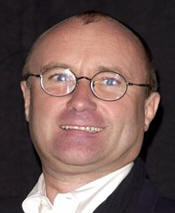
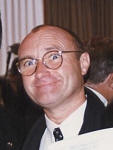
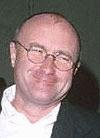
All, of course, is speculation. Collins likely can't talk about what he doesn't recognize; the same holds true for each of us. Still, but an honest, deep, from the soul smile is ready for his children, today. Probably, too, when watches a model train come barrelling down the track. This is right and good.
Christine Grail, aka the Script Consultant, is a Los Angeles-based writer.
Click above to tell a friend about this article.
Recommended
- David Simmonds
- A Pandemic Bonus
- Brave New Dietary World
- Bernie Finkelstein

- Sjef Frenken
- New Words Defined
- Modes of Transportation
- Moribund Ouch

- Jennifer Flaten
- What on a Stick?
- De-camp
- Grade Five Grad

- M Alan Roberts
- Don't Call Me American
- Christmas Monsters
- Health is Wrong Here

Recommended
- Matt Seinberg
- Sick People
- Supply Chain Shortages
- Feeding the Gadgets

- Streeter Click
- Radio Ads from Late 60s
- AJ Benza Top 40
- Write for Us

- JR Hafer
- Alison Steele
- Piet Soer
- Habit-forming

Recommended
- AJ Robinson
- The Box
- Marny
- Vaccination

- Jane Doe
- Django Unchained
- Argo
- A New Day

- M Adam Roberts
- In the Subconscious
- Dream On
- Humble Pie

- Ricardo Teixeira
- Harmony
- There is a Light
- The Unicorn



